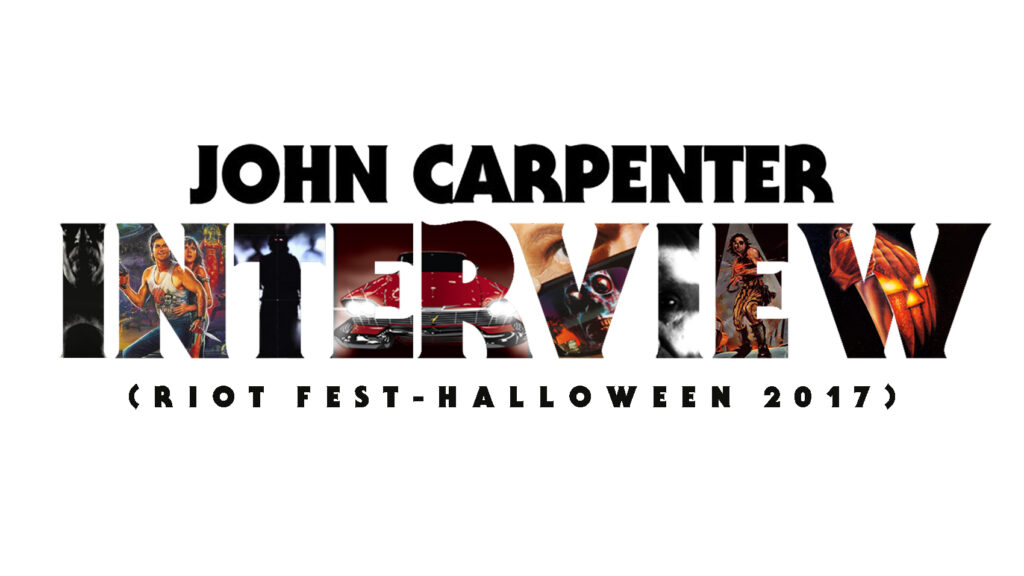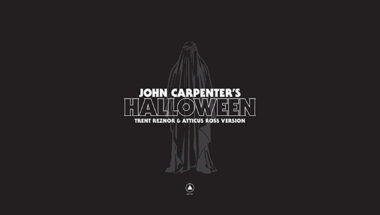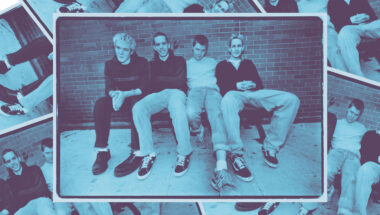You may think you know John Carpenter. He is the auteur who gave us such important cult movie classics as Escape From New York, The Thing, They Live, Big Trouble in Little China, and of course, Halloween. You may think you know him, or at least know his work, but lurking beneath is a more hidden side to the Master of Horror.
Like the shape, that lurks in the shadows, you may be aware of its presence by a creeping feeling of dread, but this side of John Carpenter has rarely been seen. Underneath the horror, sci-fi, and action, behind the director’s chair, intentionally invisible… until now. Last year he brought his little secret into the light for the first time, and if you were unfortunate enough to have missed it, you’re in luck because this creature is on the loose again: John Carpenter will once again be on tour with his band. The tour is in support of his third studio album Anthology: Movie Themes 1974-1998, a collection of 13 of his classic movie themes newly recorded with the collaborators that worked on his Lost Themes studio albums and subsequent tour dates: his son, Cody Carpenter, and godson, Daniel Davies.
Out now via Sacred Bones, Anthology is a near-comprehensive survey of John Carpenter’s greatest themes, from his very first movie (the no-budget sci-fi film Dark Star) to 1998’s supernatural western, Vampires. Those sit alongside the driving, Led Zeppelin-influenced Assault on Precinct 13 theme, Halloween’s iconic 5/4 piano riff, and the eerie synth work of 1980’s ghostly thriller, The Fog. Carpenter and his band also cover Ennio Morricone’s bleak, minimalist theme for The Thing.
Like his filmography, his music ages like wine, and is now a brick in the edifice of pop culture (Stranger Things opening anyone? A clear and admitted homage to Carpenter both musically and visually). Yet for some reason, too many people seem to be relatively unaware of the man as the musician. The iconic Halloween theme alone (arguably his biggest hit) is worthy of a spot in the annals of the zeitgeist, but when you listen to his two albums worth of original non-film related tunes you begin to realize the depth of his talent and influence. This journalist was honored with a chance to speak with Mr. Carpenter about his latest album, upcoming tour, which rock albums influenced him most, and yes, his filmography.
Riot Fest: Let’s talk about your music. Many people may not know that you scored most of your films, but I think even less know that at one point — perhaps before filmmaking — you wanted to be a rock star. Can you tell us about that?
John Carpenter: [laughs] Well, I don’t know that that’s absolutely true, I mean a rock star… I never thought of myself as going in that direction. What happened was: Back in Kentucky when I was growing up, when I got a little older I was in a band. It was a cover band, and we played fraternity parties. So, liked to watch the fraternity members get really drunk while we played. It was fun, it was great. We got a little bit of money…
RF: What was the name of your band?
JC: We called ourselves Kaleidoscope at the time. At some point I had to decide, “Am I just going to stay here in Kentucky? Or am I going to go out and at least try what I always wanted to do, which was make movies?” So that was the choice, and I decided to come to U.S.C. in Los Angeles and study motion pictures. But I never thought of myself as a “rock star” [chuckles]… ever!
RF: It’s been said that doing the score for a film was like a vacation for you after the stress of all the on-set filmmaking. I wonder if it was also an avenue for you to express yourself musically to a wider audience, or was it just a nice byproduct?
JC: [pauses] Well that was true! I expressed myself also as a musician in the sense that I got another layer of creativity on top of directing a movie. I got to add the music, which was great! It added just another dimension to the directing experience. So I’m happy I did it… really happy.
RF: How did the music enhance the directing experience?
JC: Well, it enhanced the storytelling. A director visually tells a movie story and the composer also tells the story… musically. That [music] enhances the thematic material the director is working with, as well as the narrative, and that just deepens everything.
RF: Let’s talk about your first two records — the Lost Themes albums. The titles sort of suggest that sometimes it’s the other way around as far as the “chicken or egg” of Story vs. Music. Have any story ideas ever come from the music?
JC: No. The music is all extremely practical. It’s simply that the movie needs a score… and I’m there to do it. Visual ideas have erupted, so to speak, from music… but not my own.
RF: When when writing music specifically for film, what’s your process? Are you sitting at a piano, a computer, or does it start while humming in your car?
JC: Well… all of those things. Depends on when you mean. It’s been all of those things at various times. It depends on what era of filmmaking we’re discussing…
RF: Well, I’ve heard you tell the story about how the iconic theme for Halloween came together in an hour, but let’s take a theme like the one from They Live, which is a little bit more rock/blues influenced. How did that one come together?
JC: That came together right on the spot as I was watching the footage. After 1981, I got to score to the image… which I didn’t [do] in my early films. So that was actually excellent because I could watch what the scene was about, and score to it. So. They Live came about — at least the main titles — because here comes the main character walking into Los Angeles. He’s a little Grapes of Wrath-ish. He’s a poor working guy who comes in and tries to find a spot to fit… so it was a kind of blues feel. That simply came out of doing the score while sitting in front of a screen and starting the recorder.
RF: It’s been noted in other interviews that your father was a huge musical influence on you, but if I put you on the spot: What are your favorite rock albums in terms of influence on you musically?
JC: Oh wow! Well, the Beatles’ “Help” would be one. The Rolling Stones’ Let It Bleed as well — “Gimme Shelter” was influential. The Doors’ Soft Parade was big and influential. So there’ve been several.
RF: Getting into your records, Lost Themes has sort of this saturated ’80s synth and drums mixed with a sort of modern industrial and even trance and electronica sound. Do you ever consider genre when you compose, or do you just write what feels good?
JC: God! I have no idea what you’re describing…
RF: [laughs along]
JC: [laughs] I have no idea what you just said… No. I don’t think about any of that. I think I just think about making music. I don’t know what industrial is. I just don’t know…
RF: That’s amazing, because you’ve been so influential to the genre! I mean, I hear some of some of your themes out there in pop culture. It’s funny to hear that you never really consider that.
JC: Well no, I don’t. I don’t think about any of that. It’s just makin’ music.
RF: Let’s talk about your new album, Anthology: Movie Themes 1974-1998.
JC: Well, Anthology is some of John’s best hits throughout his movie career. So it’s music from the 1970s through the end of the 1990s. It’s just a trip down memory lane. We’ve re-recorded these things, utilizing all the new technology that I can get my hands on to make it sound better than it did when we started back in the old days. It was great to revisit some of these old themes, and actually, I’ve done some music from other composers too. Jack Nitzsche in Starman, Ennio Morricone in The Thing… we’ve re-recorded those too, so they’re on the album. So it’s kind of a revisiting of John Carpenter’s movie/music legacy.
RF: The Greatest Hits…
JC: Ah kinda, yeah… kinda.
RF: Speaking of other composers, Trent Reznor and Atticus Ross released a cover of the Halloween theme just this past Friday the 13th. What did you think?
JC: That’s right! I liked it! I thought it was great! They’re very talented guys, you know. So the fact that they’d even give this a shot is excellent… I thought it was really good!
RF: Sort of a feather in the hat?
JC: Oh hell yes! Terrific.
RF: Alright! Let’s turn a bit toward the filmmaking. With little exception, you’ve stayed within the horror, sci-fi and action genres. Have you ever had the urge to create in another genre?
JC: I wanted to make westerns way back when… but, western died, so it wasn’t on the table anymore. It was something that you know only a big star could get made, like Eastwood or Wayne, so it wasn’t around for me. I really wanted to make westerns though.
RF: Well I suppose you sort of did. I mean Vampires is an obvious homage, but even They Live has a bit of a Western feel to it with the drifter element. A lot of your films do.
JC: Yeah, that’s true, but I mean an out-and-out real western. I never made one. But you know, that’s OK, it’s all good.
RF: Yeah, I mean it’s all good considering the films you’ve made. So many films — especially in horror — just come and go, but yours have stood the test of time. They get better with age, they get rereleased in theaters, so what do you suppose it is about your style that makes the work so timeless?
JC: I don’t know… I’ve always tried, when I made a movie to, I call it, aim for the horizon. You don’t make a movie for right now. You make a movie for years from now, for forever from now. A movie that’ll hold up. It doesn’t always work, because there are styles and things that now come off as phony to us that seemed really fresh and new back in the old days. But that’s what you try. You try, and aim for the horizon.
RF: You say it doesn’t always work, but you’ve had such a great track record. Can you give us a specific example of how you aimed for the horizon in any one of the films?
JC: Well, in Halloween for instance, there weren’t a lot of pop culture references, there wasn’t a lot of plotting… what I aimed for was mood. That seemed to have worked out.
RF: Speaking of Halloween… You’re born in New York, moved to Kentucky now you live in L.A. So in that film… Why Illinois?
JC: What I wanted to do was set it in the Small Town in your mind. Not a real small town that anybody knows, but a small town we imagine. So that’s why it’s Illinois. Haddonfield, Illinois; it doesn’t exist.
RF: In They Live‘s iconic fight scene, did you know as you were filming it that nothing like that had ever been captured before?
JC: Well, I had a feeling that we would do a fight scene that was extremely long, and that we really hadn’t quite ever seen. This was for obvious reasons: because a wrestler was starring in the movie. I didn’t know that it was unlike anything ever done before, but I knew it would be [trails off]… I’m really proud of that scene.
RF: Yeah! It’s amazing that, to this day, when you think of a down and dirty street fight you think They Live. I don’t think it’s ever been topped.
JC: Not like that. It’s not a fight with weapons. It’s not a fight with guns. It’s not a knife-fight. These are two friends fighting — in an alley — and one is trying to get the other one to look through a pair of glasses. So it’s a different kind of fight. And the guys — Roddy and Keith — they really, I mean they really worked it. It took them over a month to plan that fight out.
RF: Over a month of planning, wow! How long did it take you guys to shoot it?
JC: Three or four days, but Roddy and Keith and the stunt coordinator Jeff Imada worked for a month plus on the fight.
RF: I can imagine Roddy sort of brought that that sensibility from wrestling. Was it a challenge moreso for Keith?
JC: For sure, but they just worked it out. They were making contact, which is great! Unlike a stuntman fight, here two actors are actually making contact with each other, so it was great.
RF: Wow! That must have been so cool.
JC: Yeah! I’m very proud of it.
RF: What scares you most today?
JC: Well, I’ve thought a lot about that, and I think I’m scared of the same things that you are. Everybody is scared of the same things. Every human is scared of death. We know we’re going to die. That’s a frightening thing, the unknown. But we’re scared of disfigurement, or fire, or pain… everything. It’s common throughout the earth that we’re all afraid of the same things. This makes horror a universal genre, because it works everywhere.
RF: We all, at our core, have the same human condition I guess.
JC: That’s it! You know it. We’re all born, some stranger slaps us on the ass and scares the shit out of us. So, we’re born that way.
RF: So now that your greatest hits, so-to-speak, album is out of the way, what’s next for you musically? Will you continue to write and tour?
JC: I don’t know. I’m not thinkin’ that far ahead. I’m just thinkin’ day to day. But, sure, I’d love to do some more music. We’ll probably do something.
RF: I wanted to ask, have you ever considered playing some music festivals?
JC: Sure!
RF: Yeah?
JC: You got any in mind?
RF: I might have one in mind…
JC: OK. Well, we played in Barcelona, the Primavera Festival last year, and god that was fun! Oh man! It was a blast! So, we love to play festivals.
RF: I can’t speak with you, Mr. Carpenter, and not ask you about the new Halloween film.
JC: Yeah, yeah!
RF: What is the status of that, and what is your involvement with it?
JC: I’m an executive producer. I’ve been involved in all the major decisions. I’m not the director, I’m not the producer. I’m an executive producer because I’m kind of the legacy producer. I’ve been around. It looks like I’m going to do the music. We have a good script, we have a great director. Jamie Lee is coming back. It’ll be fun! Hopefully, we make a good movie.
RF: Any parting words of wisdom?
JC: [laughs] Words of wisdom. [laughs] Yeah — keep living every day. It’s all great.
RF: Well thank you, John Carpenter. We appreciate your time immensely.
JC: It’s been a lot of fun, man. You take care!
Carpenter is a down to earth genius who has created whole genres both in film and music with seemingly little effort. Over the next several weeks, he will return to the road, playing both classic movie themes and material from his two Lost Themes albums. Tickets are still available, including special VIP packages that include meet and greets with John and exclusive merchandise. For more details on special packages, visit Mr. Carpenter’s website.
These performances will once again affirm the power of the horror master’s brilliant work as a composer and musician, and undoubtedly send audiences rushing home to re-dive into the most rewarding filmography in genre cinema. He is cool and humble, and a Halloween treat that won’t rot your teeth. So give in to the devil’s music, and see the man himself live on stage in Chicago at the Aragon Ballroom on November 9th, or check out his full tour schedule here.
Trick-or-treat!


